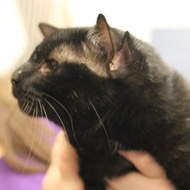
'Batman' has four ears due to a rare genetic mutation
A four-eared rescue cat named Batman has found internet fame and a new home in Pennsylvania.
The young cat was taken to the Western Pennsylvania Humane Society as his owner could no longer care for him.
Batman's unusual looks are down to a rarely seen genetic mutation, which has been documented as far back as 1938 in Ohio. It is thought to be a recessive gene mutation that is required from both the mother and father in order to produce four ears.
The society's managing director Hala Nuemah commented: "As an open door shelter, we take in and care for any animal brought to us. Just when you think you've seen it all, a four-eared cat comes in the door!"
Despite his unusual looks, three-year-old Batman has been adopted by a loving new owner in Pennsylvania after spending a month at the shelter. Initially he was not ready to be rehomed as he was undergoing treatment for an upper respiratory tract infection.
Caitlin Lasky, the society's marketing communications manager, told ABC News that Batman had been adopted by a young girl and her mother. "It was fitting because the little girl like superheroes," she added.
Image © Western PA Humane Society



 The Veterinary Medicines Directorate (VMD) is inviting applications from veterinary students to attend a one-week extramural studies (EMS) placement in July 2026.
The Veterinary Medicines Directorate (VMD) is inviting applications from veterinary students to attend a one-week extramural studies (EMS) placement in July 2026.